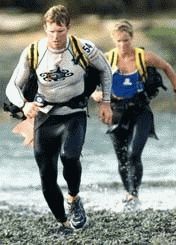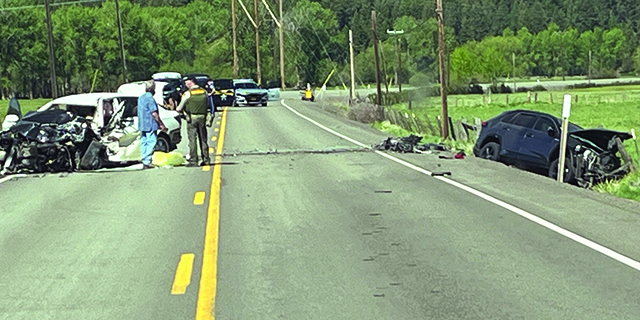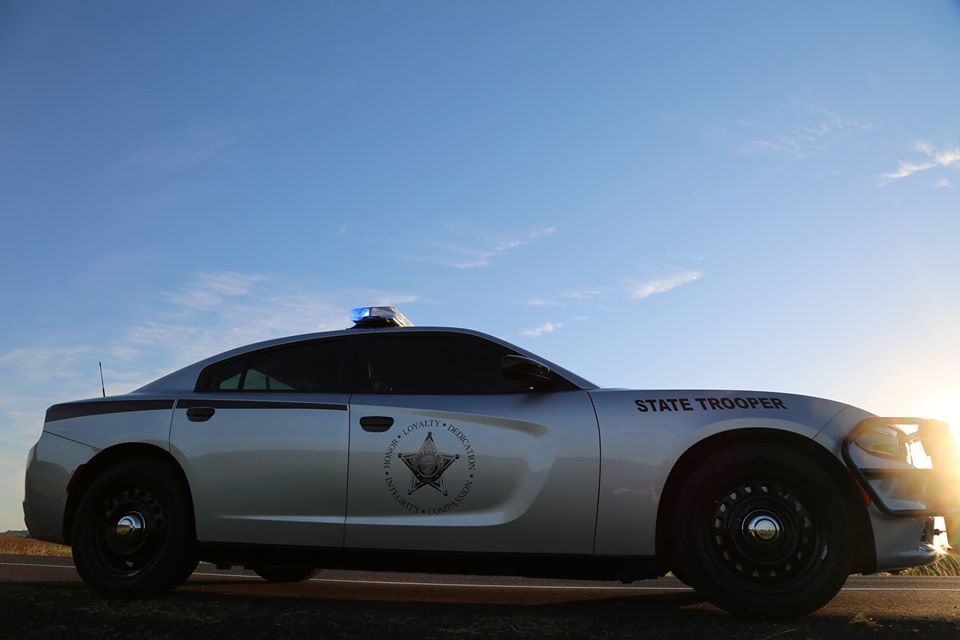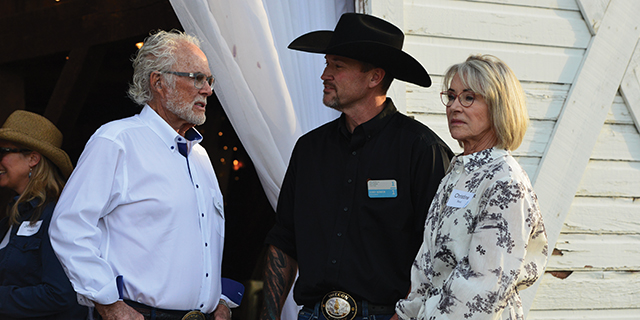HIGH ADVENTURE
Published 12:00 am Friday, August 30, 2002

- Above: True Grit member Mike Trisler exits a stream during a running phase of the race. (Submitted photos).
By Raenelle Kwock
Observer Staff Writer
Sweat, frustration, determination.
Adventure racers endure all of these and thoroughly love it.
In this sport, teams must stay together and navigate through the outdoors for as little as three hours or as long as 10 days.
Various outdoor disciplines mountain biking, hiking, trail running, mountaineering, steep snow/ice travel, flat water paddling, downriver paddling, night and day navigation, ascending, rappelling and cross country travel were evident in the July 7-16 race in Telluride, Colo.
Who would do this?
True Grit.
The team finished the Subaru Primal Quest in Telluride, Colo., in 14th place out of 70 teams. About half of the teams finished the grueling adventure.
True Grit is made up of former Union County resident Chris Posey; Mike Trisler of Hawaii; Kerry Classen of Bend; and Julie Minahan of Del Mar, Calif.
The race involved about 250 miles of round-the-clock racing. It will be televised this weekend on the Outdoor Life Network.
andamp;quot;Incredible amount of team dynamics,andamp;quot; Trisler recalled over the phone.
Trisler said adventure racing is all-encompassing mentally, physically and financially and time-consuming.
andamp;quot;There’s so much involved, you know, to be good and do well, that I think it’s the ultimate challenge,andamp;quot; he said.
Posey said the races are expensive.
andamp;quot;It’s endless what you have to have,andamp;quot; he said in a phone interview from Bakersfield, Calif., where he lives now. andamp;quot;So it adds up.andamp;quot;
For example, the entry fee for the Colorado race was $4,500 and his bike was $5,000. He had other expenses as well.
Posey does not have a sponsor. He has to cover the costs himself.
Posey and Trisler also race together in a series called Earthlink.
Posey had asked Classen, a top Xterra racer, to join them. They met Minahan one week before the race.
andamp;quot;At first, I was very worried that we
wouldn’t work as a team during the race, but we spent 10 days before, training and bonding, which helped a little,andamp;quot; Minahan said via e-mail.
andamp;quot;We worked well as a team for just coming together. I grew up in co-ed sports, which gives me an advantage of working with men.andamp;quot;
Classen had never done an expedition race such as the one in Colorado.
andamp;quot;I felt really good when we crossed the finish line,andamp;quot; he said. andamp;quot;I really felt like I could have gone for many more days.andamp;quot;
Elevation and navigation were the hardest aspects.
andamp;quot;The most difficult part was all of the elevation gain and loss that we had to do,andamp;quot; Classen said.
Minahan’s lungs were filled with mucus, which inhibited her oxygen intake at times. Posey had athletic-induced asthma. Classen suffered nerve damage in his feet.
andamp;quot;I was fine,andamp;quot; Trisler said. andamp;quot;I didn’t have any problems at all.andamp;quot;
Trisler is strong in mountaineering and navigating. He went to the U.S. Military Academy at West Point, N.Y.
andamp;quot;I think my military background is pretty strong,andamp;quot; he said.
Posey said the team that beat them in Colorado was slower and went in the right direction. True Grit lost two hours because of wrong navigation.
andamp;quot;There’s so much at stake,andamp;quot; he said. andamp;quot;All you have out there is a compass and map.andamp;quot;
Transition periods where the racers eat and sleep also hurt True Grit.
Posey said the team should not have slept in the trailer, because teams went faster sleeping on the trail.
andamp;quot;I think, in reflection, we should have done that, too,andamp;quot; he said. andamp;quot;You get comfortable in transition areas. You stay an hour longer than you should.andamp;quot;
Minahan agreed.
andamp;quot;Our transitions could have been faster, sleeping more on the trail and not during transitions,andamp;quot; she said. andamp;quot;Each team member has high and low points, which we can’t change, so we just hope we worked as a team as much as possible to get through those low points.andamp;quot;
Another difficult aspect of the Colorado race were the scree fields – loose rock areas.
Trisler said the team had to travel on andamp;quot;super highandamp;quot; mountains and sometimes rocks were kicked back down.
andamp;quot;It gets dangerous,andamp;quot; he said.
Trisler said the team traveled on about 15 peaks higher than 13,000 feet.
Even with the hard times True Grit dealt with, Posey said more people should become adventure racers.
andamp;quot;It’s a growing sport,andamp;quot; he said. andamp;quot;It’s a great sport. I wish a lot of people could be in it.andamp;quot;
For those who enjoy the outdoors, this is a sport for them, Minahan said.
andamp;quot;I enjoy the feeling of seeing a country in a way that no other tourist will see,andamp;quot; she said.
andamp;quot;I grew up in the mountains and outdoors, where adventure racing fills the fix of competing and being outside in nature. I truly enjoy training, where I can eat what I want and sleep eight hours a day, but still mountain bike, kayak, run, etc. The best ever (feeling) of adventure racing is after the race, relaxing and not feeling guilty for not doing any exercises.andamp;quot;
Trisler will not stop adventure racing until he dominates the sport.
andamp;quot;(I like) finding challenges in life, and conquering them is what the human spirit is all about,andamp;quot; he said. andamp;quot;Everyone wants to go further, faster, farther, higher.andamp;quot;





